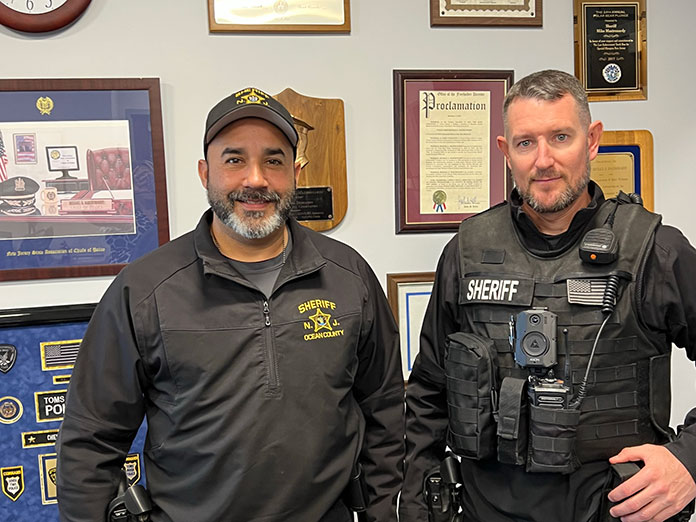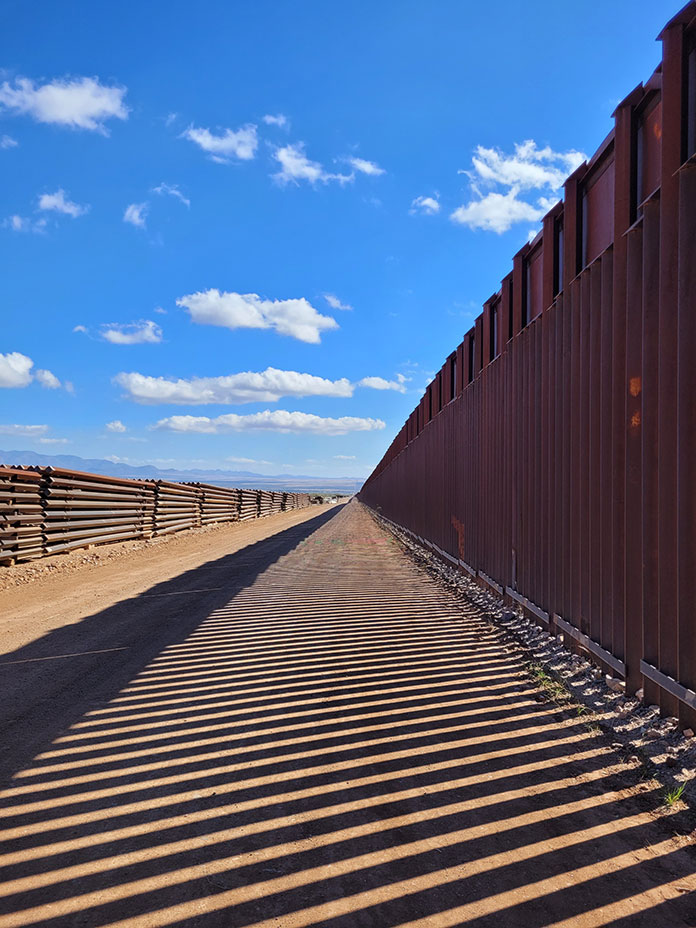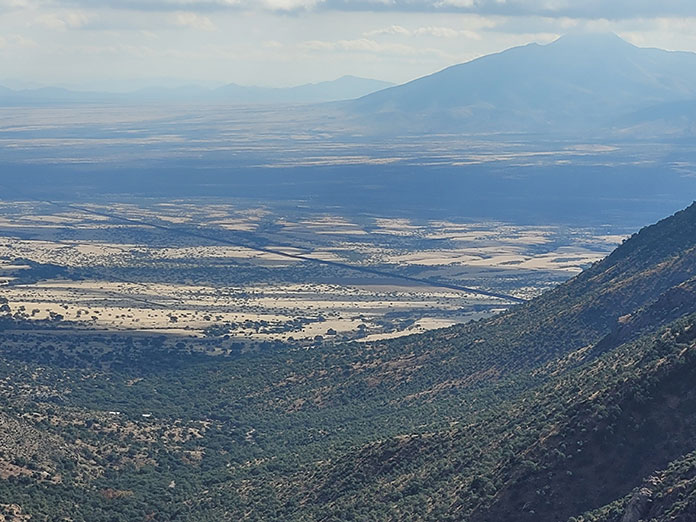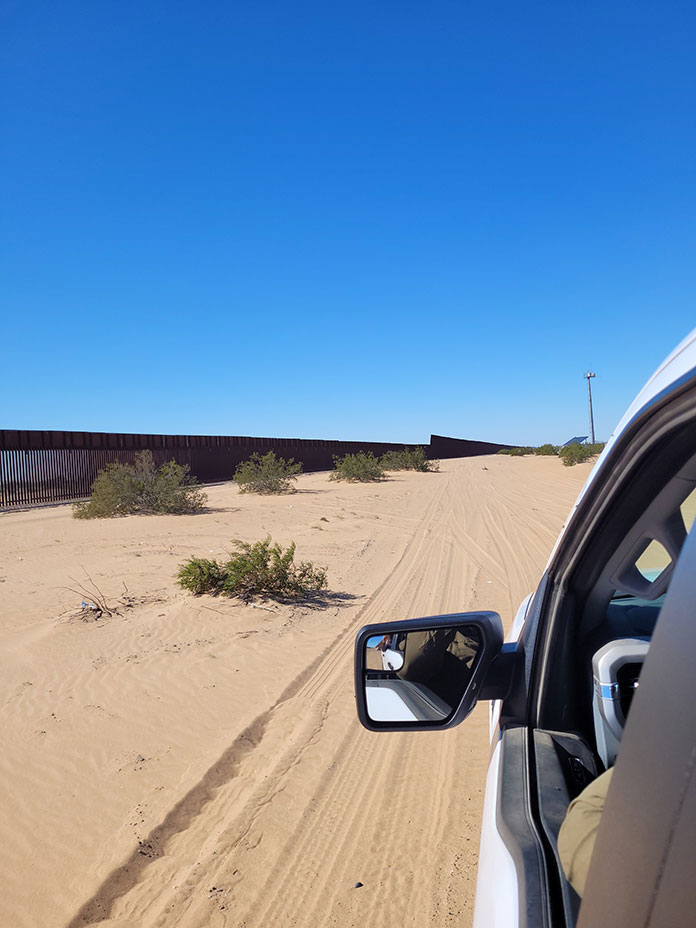
TOMS RIVER – Two Ocean County Sheriff’s Department officers bringing a fugitive back to New Jersey participated in a unique training exercise on their way to Yuma, Arizona.
“Knowing that one of the guys we were sending down speaks Spanish, I figured this was a chance to give them the experience of going to the border,” said Ocean County Sheriff Michael Mastronardy. “I called up some of my Sheriff’s friends down there, Sheriff (Mark) Daniels in Cochise County and Yuma County Sheriff (Leon) Wilmont who I am on the Board of Directors with on the National Sheriff’s Association.”
Mastronardy said he felt both Sheriff’s officers Juan Mercado and Geoff Hyatt would benefit from training related to what’s happening at the border.
After flying into Phoenix on a Wednesday, Mercado and Hyatt drove southeast to Cochise County to spend the day with the Cochise County Sheriff. A day later, the two officers met with Sheriff Wilmont to see a different view of the United States/Mexico border. That Friday, Mercado and Hyatt returned to New Jersey with the prisoner.

“The border is so many miles and not enough law enforcement officers to cover it,” summed up Mercado. “The amount of illegal people coming across is just overwhelming.”
The Sheriff’s officers noticed people walking towards the border with their backpacks on in broad daylight. As early as 10 in the morning, Mercado and Hyatt watched as various individuals looked for openings to make it into the United States.
Not all attempting to come across the border originated from Spanish-speaking countries, like those in Central America or South America. Some have traveled from far away places such as Afghanistan, the Ukraine and China, and are looking to seek asylum in the United States.
A designated entry point at the border processes those who turn themselves in to authorities.
“In the 20 minutes before we got there,” Hyatt said. “They already had about 200 people come right through. They had officers standing there waiting, knowing they were coming there.”
On a daily basis, thousands of people come through the detention area after they’re processed, they said.
Cartels appear to play a significant role in bringing the groups to the border – regardless of the country of national origin for those coming into the states. All migrants are expected to pay the cartels massive amounts of money.
“They control the whole border along the Mexican side,” shared Hyatt. “All the towns and all the paths to get to the other side.”
Cochese County authorities advised the two Ocean County Sheriff’s officers that the same is true even on the American side. There are stash houses for humans and for drugs.
“Some of the illegals that come over are put in safe houses,” Mercado added. “Now they have to pay the rest of the money they didn’t pay to come across. They have to work for the cartels to pay off the rest of the money they owe.”
The numbers can be as high as tens of thousands of dollars.
Meanwhile, transportation of illegals from Phoenix to other cities has become another booming business. Individuals are charged from $700-$900 each to hitch rides in ten-person vans.

Once a crowd of people entering illegally assembles, officers on the United States side are expected to process them. The procedure can take hours and includes working with Border Patrol officers.
Both officers acknowledged that many people coming over the border do so to find work and a better life. However, there’s no way of telling their backgrounds and if their intent represents harm to those settled on the American side.
According to Hyatt, he and Mercado had a hard time booking a hotel in Cochese County. Hyatt attributed their frustration with the fact that the government pays for hotel rooms for those who cross until family members come to claim them.
The Border Wall
The entire U.S.-Mexico border is approximately 1,933 miles. There was some kind of wall or barrier on 654 miles of this before Donald Trump became president.
During Trump’s presidency, 458 miles of wall were built. However, only 49 miles of new wall was built – the rest was either improvements or a replacement of an existing barrier.
The cost for the wall has been in the billions of dollars, and some of that had been directed away from national defense funding for this.
The Associated Press reported in the summer that although President Biden halted former President Trump’s wall project, Biden pledged to fill four gaps near Yuma. There was also 13 miles built by Biden’s administration in Texas.
Critics of the wall have stated that a wall only works if you have someone watching it. Customs and Border Protection documents leaked in March of this year showed that Trump’s new sections of wall had been breached 3,272 times, mostly with common power tools found at hardware stores.
The training in both Arizona county locations led the two Ocean County law enforcement officials to similar conclusions. There’s not enough manpower to cover the border. In Cochese County, four Sheriff’s officers patrol an 80-mile stretch through the mountains.
It all changed when the current administration came into power according to Hyatt. Materials intended to finish the border wall all sit by the wayside and are not being utilized to complete the job.
The wall itself was intended to be constructed of steel pillars filled with concrete.
Nonetheless, Hyatt admitted the fence still came with limitations. Those with a will could find their way to go through it, under it or over it. The bottoms could be torched with a hole allowing someone to slip through underneath.
“The cartels could have a 10-year-old kid sitting there with a hacksaw for two or three days,” said Hyatt. “But you’d still have more chance to catch someone by just having this open door and unfinished fence.”

When Mercado and Hyatt met with the Yuma County Sheriff’s officers, they sat through a presentation documenting how much crime had skyrocketed as a result of the open borders. The number of murders, thefts, burglaries and violent crimes showed a dramatic increase.
Mercado, who was born in Puerto Rico, had the benefit of understanding the language of many of the people who made the trip across the border. When he and Hyatt participated in a traffic stop, Mercado took the opportunity to ask questions.
“There were two illegal aliens in the back of the car, and I spoke with them,” Mercado shared. “One told me it was his second time trying to get across.”
The man said he was from Mexico and that his plan was to come to the states to find work because it was financially tough in his country. Mercado pressed to find out if a fee was involved in making the trip.
“At first he denied it and I kept talking to him,” said Mercado. “He eventually said his family paid half the money and would pay the rest when he got to the safe house.”

The total amount owed in this case was $6,000 – seemingly worth a possible new beginning.
While people from Puerto Rico can travel throughout the 50 states as American citizens, Mercado easily related to the reason his parents decided to leave their birthplace. They wanted a better life for their children – just as is the case for many who take the risk of crossing the border.
“It’s just so frustrating because we have a problem and people don’t address it,” Mercado shared. “We need to fix it and create some kind of program or temporary visa that lets people stay here legally if they have no criminal background. Let them pay their taxes here.”
Hyatt nodded his head in agreement. The trip to pick up the fugitive at the border turned out to be an eye opener for both county law enforcement officers. Both credited Mastronardy for providing them with the opportunity to see the chaos at the border in person.
Chris Lundy contributed to this story






